Whether targeted for the books they carry, the events they host, the views they express, or their identities, independent booksellers have had to contend with all manner of harassment, threats, and attacks in recent years. While some indies are unfortunately no strangers to it, others have only recently seen themselves become targets, with many worrying that as the second Trump presidency continues, bad actors will feel ever more emboldened.
Shelf Awareness has talked to a number of indies around the country to discuss the incidents they've experienced and how they've coped. More accounts will appear in a second part to this article in a future issue.
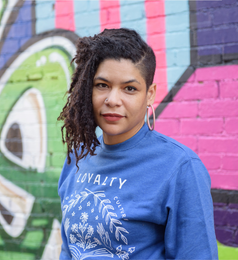
|
|
| Hannah Oliver Depp | |
"It is unfortunately absolutely becoming normal," said Hannah Oliver Depp, co-owner of Loyalty Bookstores in Washington, D.C., and Silver Spring, Md. Though the store has seen some amount of harassment off and on since its opening in early 2019, there has been a notable increase since the Covid-19 pandemic and again since President Trump took office for the second time.
Asked what form the harassment took, whether it occurred over the phone, online, or in-person, Depp said it was "all of the above," and with regard to frequency, she said that on average, harassment occurred "multiple times a week." Sometimes the store will go a few days without experiencing any sort of harassment, and then have three incidents in a single day. The frequency is such, Depp added, that it's "becoming a part of life."
One particularly common attack that Depp and her team have to deal with is fake orders of different editions of Mein Kampf. It is a title that the store has no interest in selling, and while specific editions can be removed from the store's website, it is not currently possible to simply block all editions of the book. When an order comes through, the store will refund it and send an e-mail with a link to the Library of Congress website, where the text can be found for free. Depp characterized this primarily as a "tactic to waste your time."
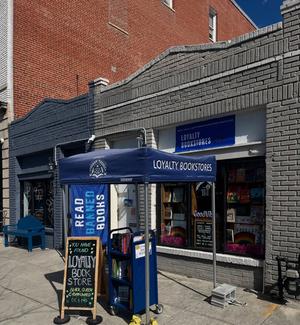 On the subject of harassment coming over the phone, Depp said that it, too, has been going on since the store first opened, and it was so bad in 2019 that the bookstore actually removed its phone number from all of its online listings. A recent spate of harassing calls made Depp consider doing the same again, but she noted that not having a phone number is also a disability rights issue. And while screening calls by letting them go to voicemail first can be an effective way to avoid harassment, some legitimate callers will not want to wait and "you can lose the sale."
On the subject of harassment coming over the phone, Depp said that it, too, has been going on since the store first opened, and it was so bad in 2019 that the bookstore actually removed its phone number from all of its online listings. A recent spate of harassing calls made Depp consider doing the same again, but she noted that not having a phone number is also a disability rights issue. And while screening calls by letting them go to voicemail first can be an effective way to avoid harassment, some legitimate callers will not want to wait and "you can lose the sale."
While most of these calls are anonymous, coming from unlisted or hidden numbers, there are some exceptions. Depp recalled a concerning string of incidents that occurred around the start of Winter Institute, where the same person repeatedly called the store to harass staff members. The person's name and phone number were exposed, and after looking them up, Depp found that the caller had a record of violent and incendiary behavior. She alerted law enforcement, and after talking with other indie booksellers, she believes the same person called several other D.C.-area stores.
Due to in-person incidents, Depp and the Loyalty team have done de-escalation training and have installed security cameras inside the bookstore. The store's Silver Spring location moved earlier this year, and shortly after reopening in the new space, Depp was there alone when a group of young men came in to "scout" the place, which involved noting things like entrances, exits, and how many people are working there. Though they left when Depp asked if she could assist them, they returned later that day. Luckily, Depp recounted, they were "only" there to record videos of themselves putting books about gender, sexuality, and race into biohazard bags, and when asked to leave, they complied.
When it comes to responding to incidents of harassment, Depp said booksellers in general are "playing whack-a-mole" and in a "defensive position." She said she documents incidents and reports them to American Booksellers for Free Expression, but acknowledged that it is hard to keep that up "if it's constant." Similarly, while some stores have seen amazing responses when talking about harassment to the public, "you don't want it to be the only thing you ever talk about."
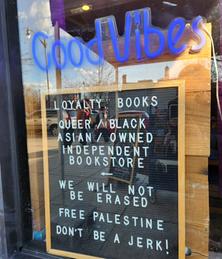 Because of "who I am and the books we sell," Depp continued, Loyalty has been a target for a long time, as have many Black- and queer-owned bookstores, and by necessity she has had to spend a lot of time thinking about things like safety protocols. She advised other booksellers, especially those who haven't experienced this sort of harassment before, to think about policies and protocols in advance, so they and their staff aren't caught unaware. In this political climate, Depp said, "it's no longer just happening to marginalized bookstores."
Because of "who I am and the books we sell," Depp continued, Loyalty has been a target for a long time, as have many Black- and queer-owned bookstores, and by necessity she has had to spend a lot of time thinking about things like safety protocols. She advised other booksellers, especially those who haven't experienced this sort of harassment before, to think about policies and protocols in advance, so they and their staff aren't caught unaware. In this political climate, Depp said, "it's no longer just happening to marginalized bookstores."
While the American Booksellers Association and American Booksellers for Free Expression offer some basic safety tips and guidelines, Depp said she felt that the associations are "playing catch up." She is currently president of the New Atlantic Independent Booksellers Association board and has had conversations about how best the association can help member stores without breaking any rules. It's a difficult problem to solve, Depp said, "but it has to be figured out."
---
Scott Abel, co-owner of Solid State Books in Washington, D.C., discussed a disturbing incident of harassment that one of the team members faced. A man called the store "using the n-word and foul language from the start," as well as speaking over the staff member and talking about their private parts.
The incident occurred on March 25 and has not happened again. It led to Solid State turning off its phones for 48 hours, and though Voice over Internet Protocol (VOIP) makes it "hard to block," Abel said, staff were told not to pick up the phone if they see the caller's number.
---
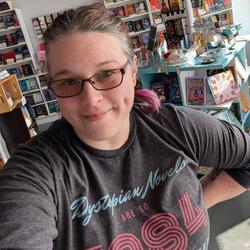
|
|
| Nicole Lintemuth | |
"For me it's been around for as long as I've been open," said Nicole Lintemuth, owner of Bettie's Pages, which she opened in Lowell, Mich., in February 2020. "I've always been outspoken about our values and that we are a queer- and woman-owned business."
The most intense time for the store, Lintemuth continued, was its first two years, when she received "active threats" and the store's sidewalk sign was vandalized fairly regularly. While that eventually tapered off to "just" random comments and messages, Lintemuth said she has seen a definite increase in the frequency of online harassment since the start of 2025.
Recently, Bettie's Pages had an incident that Lintemuth called one of the "most brazen" the store has ever experienced. A man called to ask if the store had a gay section, or sections pertaining to Black Lives Matter or women's history; given that that is a question regularly posed by legitimate customers, Lintemuth thought nothing of it. When she answered in the affirmative, the caller said he was glad, because he wanted around 30 books to burn and didn't want to drive over for nothing. Lintemuth recalled being "flabbergasted," and actually laughed at first. The man "stuck to it," and said he'd be at the store in about 20 minutes.
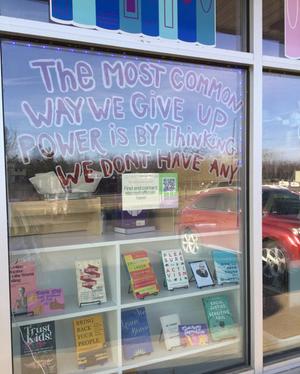 Thankfully, the man never arrived, but the incident was disturbing, and Lintemuth noted that her "biggest fear" is something happening at the store while her staff are working alone. To that end, she makes sure that her team knows that if they ever feel uncomfortable, their safety is the number one priority and to "do whatever it takes to feel safe," which could include closing down and leaving the store. So far, that hasn't happened, but every time an incident occurs, Lintemuth will "remind them that they matter more than the store."
Thankfully, the man never arrived, but the incident was disturbing, and Lintemuth noted that her "biggest fear" is something happening at the store while her staff are working alone. To that end, she makes sure that her team knows that if they ever feel uncomfortable, their safety is the number one priority and to "do whatever it takes to feel safe," which could include closing down and leaving the store. So far, that hasn't happened, but every time an incident occurs, Lintemuth will "remind them that they matter more than the store."
Lintemuth noted that this sort of harassment "is something that BIPOC bookstores deal with constantly, to a way higher degree. I'm queer and political and loud about it, but I'm privileged in a lot of ways that will ultimately keep me safe. And I hate that for my bookstore friends."
Asked how she responds to these sorts of incidents, Lintemuth said she tries to use them "as a teaching opportunity" by sharing things online and discussing why it's "so important to have more representation, more diversity, more inclusion." As far as any sort of official reporting goes, Lintemuth documents incidents for insurance purposes, "but that's about it." Based on past experience, she will only report things to the police if insurance requires her to do so.
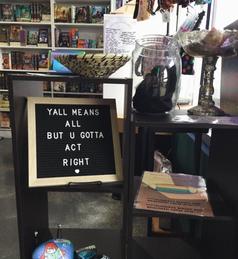 The best thing booksellers can do collectively, she continued, is to share best practices and tips, "especially from those of us more experienced," and the ABA is a "tool for that." Otherwise, "at this point, I feel like it's an entire culture shift that needs to happen. And maybe some self-defense classes."
The best thing booksellers can do collectively, she continued, is to share best practices and tips, "especially from those of us more experienced," and the ABA is a "tool for that." Otherwise, "at this point, I feel like it's an entire culture shift that needs to happen. And maybe some self-defense classes."
Overall, Lintemuth said, she's sad that she is "no longer surprised by the shit people will say or do when they feel bold. And they always feel so bold with a phone/computer between and the real-life human person they are trying to scare." What keeps her up at night, she added, are the people "who don't say anything before they show up to cause actual harm." --Alex Mutter

